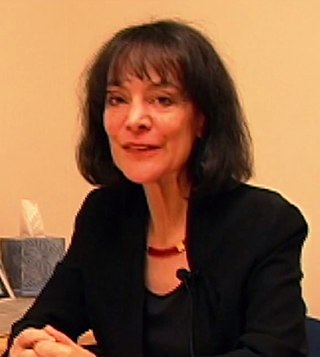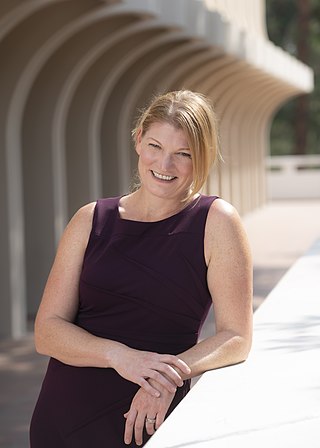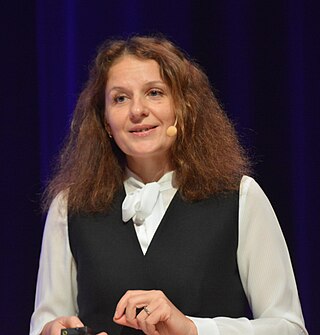
Sophie von Stumm (born 1983 in Munich) is a professor of psychology in education who studies the causes and consequences of individual differences in psychological and behavioural development across the life course.

Sophie von Stumm (born 1983 in Munich) is a professor of psychology in education who studies the causes and consequences of individual differences in psychological and behavioural development across the life course.
von Stumm attended the Schadow-Gymnasium in Berlin which she graduated from with an Abitur certificate in 2002. After receiving a BSc degree at Royal Holloway University in 2006 and an MSc at the University of Edinburgh in 2007, she completed her PhD in Psychology at Goldsmiths University of London on the topic of intelligence-personality associations in 2010. Afterwards she was awarded an ESRC postdoctoral fellowship that she completed at the Department of Psychology at the University of Edinburgh. She was lecturer and senior lecturer in Psychology at Goldsmiths University of London (2012-2017) and Associate Professor at the London School of Economics (2017-2019). She is currently professor of psychology in education at the University of York. [1]
von Stumm's work has been funded by the British Academy, Wellcome Trust, the Jacobs Foundation, and the John Templeton Foundation. [1] She has developed two research smartphone apps. [2] She won the APS Rising Star Award in 2015 [3] and the ISSID Early Career Award in 2013. [4] She is recipient of a Jacobs Foundation Fellowship 2017-2019. [5]
von Stumm studies the causes and consequences of individual differences in psychological and behavioural development across the life course. She takes an inter-disciplinary approach to observing behaviour and environments, primarily through the application of new assessment technologies that enable collecting big, high-quality data. She focuses her studies in particular on three areas: (1) the effects of early life environments on children’s language development; (2) the role of personality traits like curiosity and imagination for learning; and (3) the relationship between genome-wide polygenic scores and educational attainment. [6]

Lisa Feldman Barrett is a University Distinguished Professor of psychology at Northeastern University, where she focuses on affective science. She is a director of the Interdisciplinary Affective Science Laboratory. Along with James Russell, she is the founding editor-in-chief of the journal Emotion Review. Along with James Gross, she founded the Society for Affective Science.
William Roger Revelle is a psychology professor at Northwestern University working in personality psychology. Revelle studies the biological basis of personality and motivation, psychometric theory, the structure of daily mood, and models of attention and memory.

Morton Ann Gernsbacher is Vilas Research Professor and Sir Frederic Bartlett Professor of Psychology at the University of Wisconsin–Madison. She is a specialist in autism and psycholinguistics and has written and edited professional and lay books and over 100 peer-reviewed articles and book chapters on these subjects. She is currently on the advisory board of the journal Psychological Science in the Public Interest and associate editor for Cognitive Psychology, and she has previously held editorial positions for Memory & Cognition and Language and Cognitive Processes. She was also president of the Association for Psychological Science in 2007.

Carol Susan Dweck is an American psychologist. She holds the Lewis and Virginia Eaton Professorship of Psychology at Stanford University. Dweck is known for her work on motivation and mindset. She was on the faculty at the University of Illinois's Chicago campus, Harvard, and Columbia before joining the Stanford University faculty in 2004. She was named an Association for Psychological Science (APS) James McKeen Cattell Fellow in 2013, an APS Mentor Awardee in 2019, and an APS William James Fellow in 2020, and has been a member of the National Academy of Sciences since 2012.
Judith F. Kroll is a Distinguished Professor of Language Science at University of California, Irvine. She specializes in psycholinguistics, focusing on second language acquisition and bilingual language processing. With Randi Martin and Suparna Rajaram, Kroll co-founded the organization Women in Cognitive Science in 2001. She is a Fellow of the American Association for the Advancement of Science (AAAS), the American Psychological Association (APA), the Psychonomic Society, the Society of Experimental Psychologists, and the Association for Psychological Science (APS).

Susan Goldin-Meadow is the Beardsley Ruml Distinguished Service Professor in the Departments of Psychology, Comparative Human Development, the college, and the Committee on Education at the University of Chicago. She is the principal investigator of a 10-year program project grant, funded by the National Institute of Child Health and Human Development, designed to explore the impact of environmental and biological variation on language growth. She is also a co-PI of the Spatial Intelligence and Learning Center (SILC), one of six Science of Learning Centers funded by the National Science Foundation to explore learning in an interdisciplinary framework with an eye toward theory and application. She is the founding editor of Language Learning and Development, the official journal of the Society for Language Development. She was President of the International Society for Gesture Studies from 2007–2012.
Wendy Berry Mendes is the Sarlo/Ekman Professor of Emotion at University of California, San Francisco, United States. She was previously the John L. Loeb Associate Professor of Social Sciences at Harvard University. Her expertise is in the area of emotion, intergroup relationships, stigma and psychophysiology. At UCSF she is the founder and director of the Emotion, Health, and Psychophysiology Lab in the Department of Psychiatry.

Tomas Chamorro-Premuzic is an organizational psychologist who works mostly in the areas of personality profiling, people analytics, talent identification, the interface between human and artificial intelligence, and leadership development. He is currently a professor of business psychology at University College London (UCL) and an adjunct professor at Columbia University, as well as the Chief Talent Scientist at ManpowerGroup, and was previously the CEO at Hogan Assessment Systems.
Roberta Michnick Golinkoff holds the Unidel H. Rodney Sharp Chair in the School of Education at the University of Delaware and is also a member of the Departments of Psychological and Brain Sciences and Linguistics and Cognitive Science.

Thalia Catherine Eley is a Professor of Developmental Behavioural Genetics at the Institute of Psychiatry's MRC Social, Genetic and Developmental Psychiatry Centre, King's College London. Her work focuses on the interplay between genetic and environmental factors on the development and treatment of anxiety and depression.
Intellectual curiosity is curiosity that leads to an acquisition of general knowledge. It can include curiosity about such things as what objects are composed of, the underlying mechanisms of systems, mathematical relationships, languages, social norms, and history. It can be differentiated from another type of curiosity that does not lead to the acquisition of general knowledge, such as curiosity about the intimate secrets of other people. It is a facet of openness to experience in the Five Factor Model used to describe human personalities. It is similar to need for cognition and typical intellectual engagement.
Batja Mesquita is a Dutch social psychologist, a cultural psychologist and an affective scientist. She is a professor of psychology at the University of Leuven, Belgium, where she studies the role of culture in emotions, and of emotions in culture and society. She is director of the Center for Social and Cultural Psychology in Leuven.
Wendy Johnson is an American differential psychologist and professor of psychology at the University of Edinburgh. She holds the chair in Differential Development in the Department of Psychology and Centre for Cognitive Ageing and Cognitive Epidemiology at the University of Edinburgh.
Kathryn Paige Harden is an American psychologist and behavior geneticist. She is Professor of Psychology at the University of Texas at Austin, where she is also the leader of the Developmental Behavior Genetics lab and the co-director of the Texas Twin Project. She is also a Faculty Research Associate at the University of Texas at Austin's Population Research Center and a Jacobs Foundation research fellow.
Kaarin Anstey is an Australian Laureate Fellow and one of Australia's top dementia scientists. She is Co-Deputy Director of the ARC Centre of Excellence in Population Ageing Research (CEPAR) at the University of New South Wales, Australia, where she is Scientia Professor of Psychology. Kaarin Anstey is an Honorary Professor at the Australian National University and a Fellow of the Academy of the Social Sciences in Australia. She is a Director of the NHMRC Dementia Centre for Research Collaboration, Senior Principal Research Scientist at NeuRA and leads the NHMRC Centre of Research Excellence in Cognitive Health and the UNSW Ageing Futures Institute.
Dare Ann Baldwin is a scientist known for her research on learning mechanisms and early social skills of infants and young children. Baldwin is a professor of psychology at Oregon University. Baldwin is the recipient of various awards including the 1994 Boyd McCandless Award from Division 7 of the American Psychological Association, 1995 John Merck Scholars Award, 1997 APA Distinguished Scientific Award for Early Career Contribution to Psychology, 2006-2007 James McKeen Cattell Sabbatical Fellowship, 2006 John Simon Guggenheim Memorial Fellowship, 2006-2007 University of Oregon Fund for Faculty Excellence Award, and 2018 University of Oregon Faculty Research Award.

Candice Lynn Odgers is a developmental and quantitative psychologist who studies how early adversity and exposure to poverty influences adolescent mental health. Her team has developed new approaches for studying health and development using mobile devices and online tools, with a focus on how digital tools and spaces can be improved to support children and adolescents. Odgers is currently a professor of Psychological Science at the University of California, Irvine and a research professor at Duke University. Odgers is also the co-director of the Child and Brain Development Program at the Canadian Institute for Advanced Research.
Dieter Wolke is Professor of Developmental Psychology and Individual Differences at the University of Warwick, Department of Psychology, and at the Division of Health Sciences at Warwick Medical School since 2006. In 2020, he was named by the British Psychological Society for Distinguished Contributions to British Developmental Psychology award. He has also been named as a highly cited researcher, ranking in the top 1% of citations in Web of Science by Clarivate every year since 2018.

Yulia Kovas is a geneticist and psychologist - currently a professor of genetics and psychology at Goldsmiths, University of London, and a visiting professor at UCL, King's College, Sussex and New York universities - in the United Kingdom. Kovas received the British Academy Wiley Prize in Psychology in 2012. Kovas is the director of the International Laboratory for Interdisciplinary Investigations into Individual Differences in Learning at Goldsmiths, and leads the genetically-informative research into individual differences in mathematical ability and achievement as part of the Twins Early Development Study at King's College, London.
Claire Haworth is a reader in behavioural genetics and co-director of the Dynamic Genetics Lab at the University of Bristol.